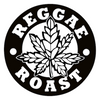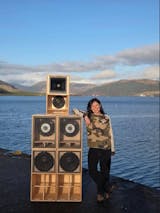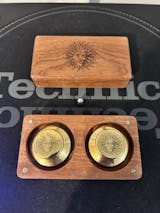The Origin of Soundsystem Culture
Here at Reggae Roast we love soundsystem culture. It brings people together, builds communities and so much more! But where did it all start?
In this post we're going to explore the origins of this influential movement that continues to inspire so many people around the world.

Soundsystems first emerged in Jamaica after World War II. In 1947, a man named Hedley Jones, drawing on his experience as a Radar Engineer in the British Air Force, built the first amplifier in Jamaica.
Using his severance pay from the army, Jones opened a shop selling radios and records. He built the amp so he could play music outside the shop to attract buyers. This innovative marketing idea was so popular that he would have street parties spontaneously forming outside the shop.

Jones' amplifiers were special because they separated frequencies into three bands: bass, mid, and treble. This allowed the controller to manipulate different parts of the music, a technique now fundamental to dance music.
Seeing the potential, other entrepreneurs began hosting similar outdoor parties across Jamaica's urban areas, where live musicians and venues were scarce.
Many of the best musicians had either gone to war, or else moved to the north of the island where they could secure better salaries catering to the tastes of American tourists after the war leaving a derth of opportunities for people in the slums of Kingston to see live music...
These soundsystem events filled that gap. They used horn-shaped stainless steel loudspeakers and hung them from the trees to maximize sound spread so as many people could attend as possible.

Tom "The Great Sebastian" (AKA Tom Wong) was a prominent event organiser who powered his events with a Hedley Jones amplifier, and he was the first to coin the term "sound system."
As Hedley Jones recounts... "Wong showed up my store to buy an amplifier. Cash in hand. So, I built an amplifier for Tom. He promptly called it a Sound System."
As these 'soundsystem events' grew, so did the demand for more powerful equipment, leading to intense competition among dance organisers.
The burgeoning popularity of sound systems spurred an informal economy, with vendors selling everything from juices to jerk chicken. To dominate the scene, sound system operators sought to outdo each other, aiming to "flop" their rivals' dances with superior sound quality, tunes and entertainment.

Early sound system pioneers included Tom The Great Sebastian, Roy Johnson, Duke Reid, and Coxsone Dodd, who later founded Studio One Records, a cornerstone of Jamaican music.
Initially, sound systems played imported R&B records from the U.S. Coxsone Dodd, for example, brought back records during his stints in America. His expertise in cabinet building and mechanics helped him establish one of Kingston's top sound systems.

By the mid-1950s, the sound system scene became crowded. Competitions, known as sound clashes, emerged, where systems battled to showcase the best music and sound quality. Exclusive records became crucial, with selectors guarding their unique tracks and going to great lengths to hide their sources from competitors.
Soundsystem crews would send scouts to the USA to buy the best records that they could get their hands on, but as time went on more and more of these records were bagged and they became harder and harder to come by. That combined with the change in direction in popular music in the U.S, away from the RnB records that the Jamaicans loved. This resulted in less and less of this style of music was even being made.
As the supply of American R&B dwindled by the late 1950s, Jamaican sound system operators began creating their own music. Coxsone Dodd led this movement, recording local musicians in radio studios, and producing what became known as "Jamaican boogie."

During Jamaica's push for independence in the early 1960s, there was a drive to create a unique cultural identity. By altering the rhythm structure of American R&B, emphasising the second and fourth beats, Jamaicans developed the off-beat skank, so heavily associated with Ska & Reggae. The first Ska recording, "Easy Snapping," marked a new era in Jamaican music...

These early recordings were exclusive to sound systems and not for sale. It seems crazy to think of now, but the way soundsystem operators would think is "why would i even want to make one copy of this record. What if one of my rivals was to get hold of it".
It wasn't until later that the concept of pressing records for the masses even became a consideration as at the time, the soundsystem made their money through the soundsystem events and not through selling records. They were reluctant to do anything that may harm their businesses.
However, as more people acquired record players, demand grew. In 1959, Coxsone Dodd decided to press records for sale, marking the birth of Jamaica's recorded music industry.
In 1962, Coxsone Dodd, along with a team of engineers, established Studio One, a production hub that recorded legendary artists like The Wailers and Lee Perry.

The 1960s saw the evolution from Ska to Rocksteady and then to the more politically charged and spiritual Roots music. In 1968, Toots and the Maytals released "Do the Reggae,". It was supposedly the first time the term was used, giving this new style of music its name. Reggae's international appeal grew, with artists like Bob Marley achieving global fame.

In the 1970s, sound engineers began experimenting with reverb and delay, creating yet another offshoot genre... Dub. A genre that placed producers in the spotlight and birthed remix culture, demonstrated Jamaican's incredible ability to experiment, innovate and evolve. Selectors started to play vocal tracks alongside instrumental B-sides, allowing Toasters and Deejays (MCs) to perform live alongside the selectors and operators. They would play the vocal track and then flip the vinyl to pay the instrumental or Dub side which the MC would toast over.

As Jamaican migrants moved to New York, their culture influenced the local music scene, leading to the birth of Hip Hop. In the UK, Jamaican immigrants brought sound system culture to cities like London, Bristol, and Birmingham, giving rise to genres such as Jungle, Garage, and Dubstep.

Today, elements of sound system culture, like the bass drop, are fundamental to dance music worldwide. This rich legacy, originating from Jamaica's post-war streets, continues to shape and inspire the global music scene.



Wonderful read! Give thanks and praise to those who pioneered the search for sound perfection and to unite us all through music!
Aberystwyth Sound System Society on
Wonderful read! Give thanks and praise to those who pioneered the search for sound perfection and to unite us all through music!
Aberystwyth Sound System Society on